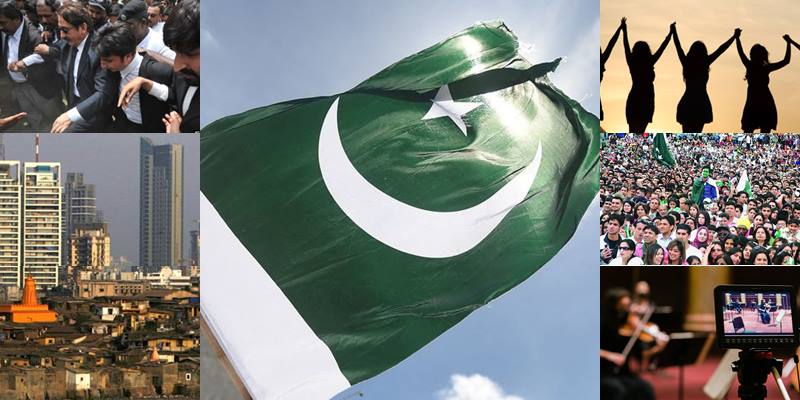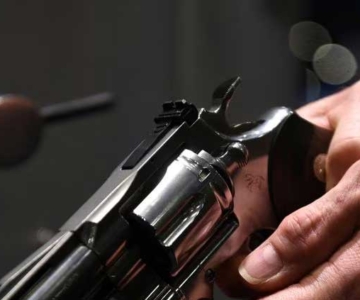Pakistan’s existentialist crisis is no longer a strictly Pakistani issue. Its potential repercussions have emerged as a cornerstone of global debates on regional stability and international concerns on terrorism and nuclear proliferation. The clichès on Pakistan’s disintegration and meltdown have also been done to death in the international media and policy brigades across the world. Perhaps, what the world has not yet fully comprehended is that Pakistan is essentially a transitional country where the old order is crumbling, giving way to a newer society that is grappling with geostrategic compulsions, domestic violence and a post-colonial state which refuses to realign its structures and priorities to a ‘new’ Pakistan.
To begin with, never in Pakistan’s history have so many women been active in the public spheres: from higher education to the workforce and from subaltern resistance movements to national politics. The two leading public sector universities i.e. the Karachi and Punjab Universities respectively, cater to a majority of female students. It is no coincidence that women parliamentarians are far more active in the national assembly and senate and not even shy of resisting patriarchy and clergy in their public roles. Increasingly, urban Pakistan is shedding its traditional conservatism by creating space for women’s inclusion in the media, and other segments of the services sector (also the largest contributing chunk of the GDP).
The impetus for this transformational moment can be located in the rapid urbanization that has taken place during the last two decades. Among South Asian countries, Pakistan is the most urbanized polity (officially 35% but unofficial estimates suggest it could be close to 50%), leaving India and Bangladesh behind. Villages of yester years are peri-urban settlements in rural Pakistan; and peri-urban is turning into what would be termed as ‘urban’. Furthermore, it is increasingly a country of young people. More than 65% of Pakistan is under the age of 26 and in another decade, the ‘youth’, their voice, concerns and energies would drive Pakistan. Already the signs of this under-studied revolution are exerting pressures of the ‘old’ Pakistan.
Deregulation of the telecom sector and the media in the 1990s has spurred another agent of change; and never before has Pakistan witnessed such unprecedented information revolution. Over 102 million Pakistanis are mobile telephone subscribers and are exposed to at least two dozen news channels in all languages making them aware of what happens in the political arena, the markets and the world. While estimates vary and definitional issues inhibit a clear estimate, it can be safely assumed that the size of intermediate classes has consistently increased during the past two decades. On estimate suggests that the ‘middle class’ comprises 30-40 million people.
Small wonder that Pakistan was the home to a unique movement for rule of law, democracy and human rights led by lawyers in 2007-2008. Within a few months of the lawyers’ protest against the arbitrary removal of the Chief Justice by General Musharraf in March 2009, almost all the forces comprising the ‘civil society’ joined in to support the deposed Chief Justice. This was a tremendous moment, when a society in transition made its presence felt and stunned conventional pundits and international opinion alike. As events unfolded in the period 2007-08, the state used its conventional high-handed methods to suppress the transformative yearnings of an expanding, confident and globalized middle class. Despite opposition by the conventional establishment (civil-military-bureaucracy, security agencies, economic elites), Pakistan returned to a quasi-democratic rule in 2008. The struggle to govern an entrenched but weakened state in a society undergoing rapid transformation continues.
It is true that concurrent trends have not been most encouraging. The war on terror, continued onslaught of Islamic extremism, attempts to silence a moderate majority of Muslims, and persecute minorities have resulted in widespread violence and a temporary retreat of the progressive forces in Pakistan. Since 2008, there have been nearly 2500 bomb blasts killing thousands of people and the security agencies have been battling the extremists in various parts of the country. On January 4th 2011, the murder of Punjab Governor Salmaan Taseer and in March, the assassination of the Minorities Minister Shahbaz Bhatti, has momentarily affected the space which the civil society had created in the last decade. This expanded space for secular civic action remains a major threat to the traditional nexus between the clergy and their patrons in the security establishment.
While many have analysts have lamented the state of bigotry and shrinking space for ‘liberals’, the moderate elements of the civil society within Pakistan have been making their presence felt across the country. Immediately after the brutal assassination of Salmaan Taseer, Citizens for Democracy (CFD), an umbrella group of over 80 organizations and reputable individuals, joined hands to reclaim the moderate and progressive Pakistan from the narratives of bigots in Pakistan. CFD did not emerge in a vacuum. It had already been formed in December 2010, when a few activists came together on a one-point agenda against using religion in politics and the misuse of blasphemy laws in the country. After Taseer’s assassination, when gloom defined the public mood, and it was assumed that few would speak up, the CFD and other civil society networks such as Concerned Citizens of Pakistan, Human Rights Commission of Pakistan to name a few, continued to speak up and condemn the violence. CFD organized a reference for the slain governor Taseer, and later held several vigils and protests across the country. Admittedly, the attendance at such events has been short of expectations, but it needs to be remembered that it is only with time and effective coalition building, that more and more Pakistanis would be comfortable with expressing their views in the public glare.
The hallmark of CFD’s campaigning was a mass signature campaign held in March 2011, appropriately titled ‘silence means more blood’. The letter campaign endeavored to resist the increasing acts of vigilante violence in the name of religion. The letters signed by thousands of Pakistanis, from all walks of life, were addressed to the President, Prime Minister, Interior Ministry, Chief Justice of Pakistan, Chief Ministers and heads of all political parties. The letter protested against assassinations of the Punjab Governor and the Minorities Minister and condemned the threats meted out to brave individuals such as parliamentarian Sherry Rehman amongst others, who refused to remain silent.
Amassing 15,000 signatures is no mean task, given the overall culture of intimidation that extremists have been perpetrating in Pakistan. Interestingly, the signatories comprised madressah students, rickshaw and taxi drivers and ordinary Pakistanis who responded to various calls via loudspeakers, pamphlets, social media and other means to express their solidarity with what was being imposed on them in the name of religion.
Following this impressive feat, more campaigns are being organized across the urban centers of Pakistan. Labor coalitions, Pakistan Socialist Movement, human rights groups and community-based organizations are gradually joining in to provide a wider platform for mobilization of public opinion.
This is not to say that the civil society is a monolith in Pakistan. Experience since January 4th has also demonstrated that there are differences among various civil society groups, as to what sort of strategy they should be pursuing in the face of brazen threats and unabated violence reeked by the extremist organizations. Furthermore, the issue of religion and the Prophet’s (pbuh) stature evokes mixed feelings in a country where religious indoctrination has been a state project since late 1970s. Pakistan’s media, education system and the infinite mosques network are ruled by bigoted versions of Islam and narratives, which call for power-capture in the name of Islam. Most importantly, a wider coalition of civil society is yet to be formed, though initial signs of it emerging cannot be missed. It remains to be seen whether this momentum can be built upon and carried into the next phase of public activism.
The encouraging signs however, are that within the mainstream media, TV anchors like Najam Sethi and Nasim Zehra, and several writers in the press have been able to articulate the counter-narrative to extremism. The political parties, which had stumbled into a state of inaction after the murders of Taseer and Bhatti, are gradually getting out of their fearful state of being. The co-chairperson of the Pakistan Peoples Party, Bilawal Bhutto-Zardari, Mian Nawaz Sharif of PML-N, Aswandyar Wali Khan of the Awami National Party among others, have categorically condemned the acts of violence committed in the name of religion. Deep down, these political leaders also know that their own survival is linked to the existence of a moderate, tolerant and plural Pakistan without which, popular constitutional politics cannot take place.
By the looks of it, Pakistan’s growing middle classes with an expanding rate of women’s participation in public affairs cannot be held hostage for a long time. The simple economic imperatives of women’s education and employment are a major boost for the articulation of progressive and moderate political mobilization. Here, we would have to redefine what ‘moderation’ means in a transitional polity such as Pakistan. Whilst sociologists will be busy in researching this phenomenon and anthropologists observing the daily lives and mores, it is clear that the Taliban and Al Qaeda versions of Islam, simply will not work in the ‘new’ Pakistan that is struggling to unfetter itself from the traditional socio-economic structures and cultural hegemons.
There is a lesson or two for the civil society of Pakistan, looking at international experience. Effective social change happens through the formation of broad-based, yet focused coalitions for action and often in concert with the political parties. The political and civil societies cannot operate in isolation of each other and therefore, need to cohabit and engage. Citizen groups can effectively pressurize political parties to deliver on citizen-focused agendas. Political parties on the other hand, can benefit from the expertise and perspective that relatively non-partisan citizen activists can bring to their wider agendas.
Lastly and perhaps most importantly, Pakistan’s civic action cannot proceed without the inclusion and fulsome engagement of its young population. Political mobilization of the youth will be vital for the moderate sections of civil society to advance the agenda of pluralism, secularism and peace in the country. Therefore, citizen groups would need to enter domains that they have been shy of: public sector schools and colleges, madressahs, snooker and carom clubs, muhallah associations and other venues. Engaging with the youth is an imperative to give a meaningful direction to the change that is already taking place. Whether we like it or not, Pakistan’s youth bulge is its greatest asset and key to its progress in the twenty first century.
Raza Rumi is a policy adviser, writer and editor based in Lahore. He blogs at
www.razarumi.com and manages webzines Pak Tea House and Lahore Nama. Email:razarumi@gmail.com



